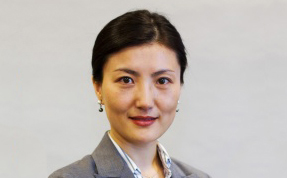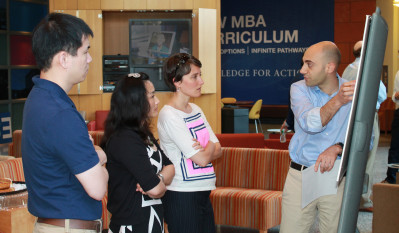 Guest post by Charlotte Ren, Visiting Assistant Professor of Strategic Management at the School of Social Policy and Practice. Ren teaches and oversees the students taking part in the pilot semester of MGMT 892, also known as the Collaborative Innovation Program.
Guest post by Charlotte Ren, Visiting Assistant Professor of Strategic Management at the School of Social Policy and Practice. Ren teaches and oversees the students taking part in the pilot semester of MGMT 892, also known as the Collaborative Innovation Program.
In a fast-changing business environment, business success is driven by a firm’s ability to create and capture value through innovations. Thus, the processes they use to develop innovations, the choices they make regarding how to commercialize their innovations, the changes they make to their business models to adapt to the dynamic environment, and the strategies they use to position and build a dominant competitive position are all important issues facing the firm.
The Mack Institute’s Collaborative Innovation Program (CIP) provides a unique opportunity for MBA students and graduate students at other Penn schools to get hands-on experience tackling these issues. Since its launch in the summer of 2014, the for-credit program has attracted about 30 students from Wharton (both Philly and San Francisco campuses) and Engineering (in particular, Integrated Product Design). The students were grouped into teams and matched to semester-long projects from six of the institute’s industry-leading corporate partners.
The CIP partner companies are leading organizations in a variety of industries, including apparel, automotive, electronics, home appliances, personal care, and software. They are also world famous multinational corporations with headquarters in the United States, Europe, and Asia. In The challenges they posed to CIP students include the following:
- Survey and forecast an emerging innovation
- Identify a market niche for the partner
- Implement internal changes (e.g., HR, structure) to foster corporate entrepreneurship
- Understand the relationships between innovation and brand
- Devise strategy and tactics to cope with competition
- Recommend alliance strategy to commercialize an innovation (e.g., joint venture, M&As)
 Working with partners on these challenging issues requires deep industry, functional, and sometimes institutional expertise. Therefore, it’s a great opportunity for CIP students to leverage their rich work experience in various industries or countries. They also find the opportunity to apply and integrate their knowledge in finance and accounting, marketing, operations, strategy, human resources, as well as engineering.
Working with partners on these challenging issues requires deep industry, functional, and sometimes institutional expertise. Therefore, it’s a great opportunity for CIP students to leverage their rich work experience in various industries or countries. They also find the opportunity to apply and integrate their knowledge in finance and accounting, marketing, operations, strategy, human resources, as well as engineering.
More importantly, the program provides an important platform for students to build their competence in scoping, strategizing, and problem solving. The teams have use the FOCUS Analytical Framework (the acronym of Frame-Organize-Collect-Understand-Synthesize) to work on the projects throughout the semester. The framework provides guidelines on the framing of key questions, hypothesis development, data collection, analysis, and storytelling.
What makes CIP distinct from a regular research project is the need to engage the partners actively. Each partner has one contact person who is responsible for providing feedback and data to our team. Sometimes the contact person is representative of a fairly large group of executives covering multiple departments, thus our students need to take into account the needs and preferences of a diverse set of audience (e.g., marketing, R&D, and legal). For projects hosted by US companies, some teams have taken advantage of the geographic proximity and pursued face-to-face interaction to better understand the needs of the partners. While travel is less feasible for projects of foreign companies, our teams have come out with creative solutions as well. For example, one team elected a liaison, who’s native to the partner company’s home country, to communicate on project feedback and logistics back and forth, which worked out well.
Upon the recent completion of their midpoint presentations, our CIP teams have successfully reached the first milestone. With a clearly-laid-out work plan and strong work ethics, there is no doubt that next month they will deliver to our partners more comprehensive and in-depth research and insights on emerging innovations. They are working hard and right, and the exciting results will be forthcoming soon!
Trying to figure out if CIP is for you? Read more from past attendee Wanhang Du, and from his classmate Gundeep Kaur.



